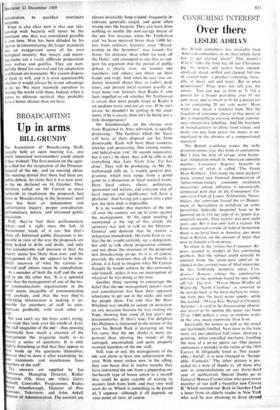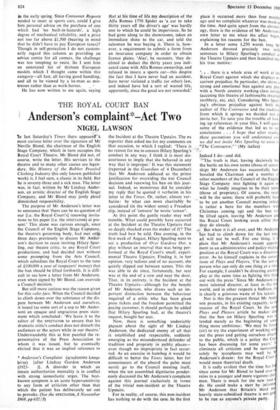CONSUMING INTEREST
Over there
LESLIE ADRIAN
Are British consumers less excitable than American consumers, or do they simply have less to get excited about? This month's Which? talks the hind leg off our Christmas pig. Its testers and tasters have opened, analysed, sliced, sniffed and chewed 360 tins of canned ham—a product consisting, basic- ally. of meat, salt and water. But in what proportions? Price does not tell you the answer You can pay as little as 7s I Id a pound for a brand providing over 95 ner cent meat. and as much as 9s 8d a pound for a tin containing 20 per cent water. More water may mean a tenderer ham. But the freedom of consumer choice to buy moist or dry is impossible to exercise without compul- sory informative labelling. And the freedom of manufacturers to dilute food values. and make ■ou pay ham prices for water, is un- regulated in the absence of a compositional standard.
The British watchdog makes the right growling noises over this bone of contention. But I miss the note of savage, even hyster- ical. indignation which its American opposite number. Controller Reports, brought to exposure of what it called 'The Great Ham Robbery'. This stung the meat packers' trade journal into frenzied denunciation of 'subscription-hungry consumer revelation magazines' whose influence it sarcastically compared with that of the Consumers' Co- operative Club of Lower Ashhottom. Never- theless. the camnaign forced the us Depart- ment of Agriculture to withdraw an order permitting federally inspected ham to be pumned up to 116 ner cent of its 'green' (i.e. original) weight. That victory was won eight years ago. Butt it was only half a victory. On hams processed outside of federal inspection there is no legal limit in America. any more than in Britain. on the amount of water that may he howeht at ham prices.
So often in the 'sixties has Consumer Re- ports warned its readers of this continuing problem. that the subject could scarcely be omitted from the seven-pane send-un in- cluded in the current issue of Mad magazine. In this brilliantly inventive satire. Con- demner Renews salutes the constructive solution to the nrohlem found by two nublic oft-ialg The first—lollavor Heinz Winner of Waesville. North Carolina'=is reported to be petting back at the meat packers by iniect- ing ham into the local water supnly. while the second—'Mavor Eric Wessel of Chianeil. Arizona'—is said to be discouraging obnoxi- ous practices by upnina the water tax from 23 to 3.000 dollars a year. so makine water in the area more expensive than ham.
Inevitably the testers as well as the tested are laughingly libelled. Next door to the ham story are two identical half-tones. showing a grinning. white-overalled mechanic fondling the nose of a iet-set sports car. One picture announces a mistake in the rating of the 1969 Corvex II. Originally listed as 'Not accept. able—Awful'. it is now changed to 'Accept- able—Fantastic.' The other picture is pre- ceded by a note of thanks to 'all those who sent us congratulations on our thirty-third year of publication. Special thanks go to General Motors Corporation who gave every member of our staff a beautiful new Corvex II.' Which reminds me. Back in October I had a letter from an elderly reader in New York who said he was planning to drive abroad in the early spring. Since Consumer Reports tended to sneer at sports cars, could I give him personal advice on the purchase of one which had 'no built-in-hazards', a high degree of mechanical reliability, and a price not too far above £1,500 (bearing in mind that he didn't have to pay European taxes)?, Though in self-protection I do not custom- arily regard this column as providing an advice centre for all corners, the challenge was too tempting to resist. So I sent him an annotated list of thirteen European models which I thought came within this category—all fast, all having good handling, and all to be viewed by a he-man as mis-
tresses rather than as work-horses. _ e He has now written to me again, saying that at his time of life my description of the Alfa Romeo 1750 Spider as 'a car to take thirty years off the driver's age' was hardly one to which he could be impervious. So he had gone along to the showrooms, taken an immediate shine to the car, and told the salesman he was buying it. There is, how- ever, a requirement to submit a form from an insurance company in order to obtain licence plates. 'Alas', he recounts, 'they de- clined to deduct the thirty years you indi- cated came with Alfa Romeo ownership, and refused to insure a sports car—this despite the fact that I have never had an accident, have never violated a traffic (or other) law, and indeed have led a sort of wasted life, apparently, since the good are not rewarded,'















































 Previous page
Previous page